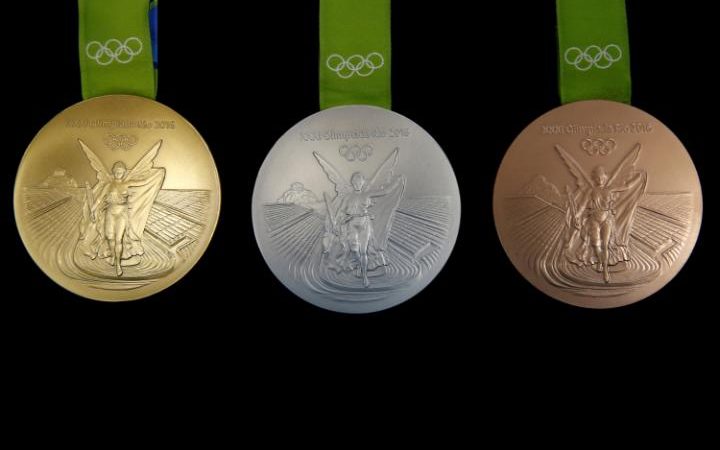I am obsessed with the big O! That’s right, I am a certified Olympiphile. My first professional haircut was a Dorothy Hamill. I remember the elated phone call from our neighbors in 1980, screaming that we had to turn on the TV to see what the U.S. hockey team was doing. In the summer of ‘96, when I was practicing law, working 80 hours a week, I still watched the games on tape every night when I got home, even at 2 a.m., and will never forget seeing Kerry Strug land on a sprained ankle to win gold for the U.S. team. My eyes are watering just typing that.
And one late night, during the midnight-to-2 a.m. broadcast of the 1996 games, the discussion on NBC turned to a paper that had been published a year earlier by the American Psychological Association, titled, “When Less Is More: Counterfactual Thinking and Satisfaction Among Olympic Medalists“ written by Victoria Husted Medvec, Scott Madey and Thomas Gilovich.
Contrary to the obvious, this study showed that happiness among Olympic medalists is not as ordinal as one might think. The natural assumption would be that gold medalists are the happiest, followed by silver, then bronze, but it turns out, bronze medalists are significantly happier than silver medalists. Significantly.
The reason, the researchers concluded, was that a person’s happiness is relative to the alternate outcome. For a silver medalist, the alternate outcome is winning gold, but for a bronze medalist the alternate outcome is not winning a medal at all. This plays out over and over as you watch the games — the bronze medalists just look more jubilant.
In fact, this can also be seen comparing the unexpected bronze medal, like what the Swiss gymnast won on the vault, to the expected gold, like that of expected-victor Simone Biles, and worse, the slight disappointment of silver medalist, Maria Paseka. Yes, Biles was happy to win gold, but did you see Giulia Steingruber celebrate? That was the picture of pure Olympic joy! Winning her country’s first medal ever in gymnastics was far more rewarding for her than simply achieving what was assumed.
Somehow, bronze medalists see themselves as being one of the top three in the world, which is an amazing feat, but silver medalists see themselves as losing to just one person, that maybe on a different day they could have beaten — should have beaten.
We all do this, of course. We’re ecstatic about the 8 percent return on an investment, until we find out that the stock we didn’t choose did much better. Likewise, we’re twice as happy if we find out that the opposite is true, and the other stock tanked. Somehow, objective happiness — the pleasure we get simply from the outcome — is tainted by the potential alternate outcomes. “I could have done better” makes a great result feel mediocre, or even crappy, and “It could have been worse” makes an ordinary result feel like an immense victory.
I saw this recently while my husband and I were driving home from the movies. An SUV sped past us, not seeing the Highway Patrol car on our right. The red and blues came on immediately and tailed them all the way to the next exit, which happened to be ours.
The SUV exited, as required, but at the last minute, the CHP returned to the highway and sped off. We’ll never know if he got another call, or was just trying to scare them into slowing down, but as we pulled up next to them on the exit ramp (while they were waiting to get right back on the highway), there was sheer jubilation in that car. The driver and all the passengers were laughing, pumping their fists and cheering wildly, for obvious reason.
Even though they were slowed down, forced to exit and given a good scare, they were clearly much happier than if they had just been left alone to speed home. The alternate outcome they chose to see was getting a ticket, rather than the alternate outcome of just being free to drive on undisturbed, and in the face of that, they were seriously happy. What we compare our results to is always a choice.
So, with that in mind, the way to stay happy is to commit to looking at your end result as the best possible outcome, and think of the alternate as whatever would have been much worse. Never compare what you’ve got (like a silver medal) to what someone else got (like a gold medal), but rather, think of how astounding your final product is (like an Olympic medal of any color), and what it took to get there, and how happy it would make anyone else in the world who isn’t you right now.
In life, we should all go for gold, but enjoy it as if we won bronze. Or didn’t get a speeding ticket.
Go Olympians! Know that your whole country loves you, is beaming with pride, and will be happy with whatever you bring home, as long as it’s not the Zika virus.
————-
Valerie Alexander is a keynote speaker and corporate trainer, and a former securities lawyer, investment banker and Internet executive. She now works with companies and organizations seeking to retain their top talent by making happiness in the workplace a priority and ensuring that female professionals are recognized and rewarded for their work. Her many books on Happiness, Success, and Success for Women can be found on Amazon.com, and she can be reached directly through her website, SpeakHappiness.com.
